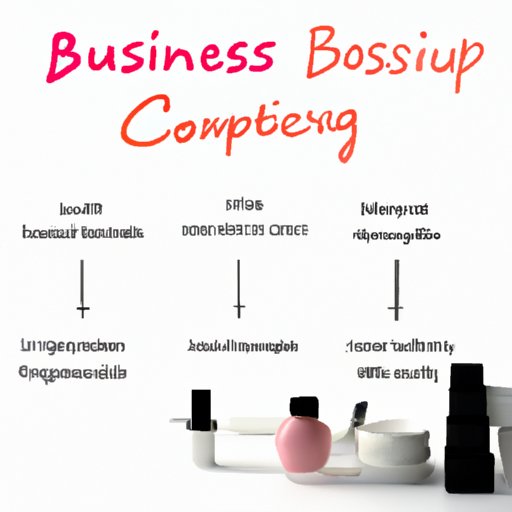Introduction
Starting a cosmetic business can be an exciting and rewarding venture. But it’s important to remember that there are several steps involved in the process, from researching local laws to securing financing. By understanding the requirements, you can ensure that your business is successful.

Definition of a Cosmetic Business
A cosmetic business is any business that manufactures or sells products used for personal grooming, such as makeup, skincare, hair care, and fragrances. These businesses can range from home-based operations to large retail stores.
Overview of the Process to Start a Cosmetic Business
Starting a cosmetic business involves several steps, including researching local, state, and federal laws; establishing a legal entity; choosing a location; obtaining insurance; researching the competition and identifying your target market; developing a business plan; obtaining financing; securing licenses and permits; and selecting suppliers, products, and pricing. This article will walk you through each step in detail.

Outline the Requirements for Starting a Cosmetic Business
Before you can open a cosmetic business, you must first research local, state, and federal laws. Each jurisdiction has its own regulations regarding the sale of cosmetics, so it’s important to make sure you understand the rules and comply with them. Additionally, you should establish a legal entity, such as an LLC or corporation, to protect yourself from liability.
You will also need to choose a location for your business. Consider factors such as rent, zoning laws, and access to customers. Once you’ve chosen a location, you should obtain insurance to protect your business against potential risks.

Research the Competition and Identify Your Target Market
Once you have the legal and practical aspects of your business taken care of, you can begin to focus on marketing. You should identify your competitors and analyze their strategies. Ask yourself questions like: What do they offer? How do they price their products? What sets them apart?
With this information, you can develop a unique selling proposition (USP) for your business. This will help you stand out from the competition and attract customers. You should also identify your target market by researching demographic data, such as age, gender, income level, and geographic location.
Develop a Business Plan
Now that you have done the research, it’s time to start writing your business plan. This document should outline your objectives, financial projections, and marketing plan. It should also include a SWOT analysis, which stands for Strengths, Weaknesses, Opportunities, and Threats. This will help you identify potential risks and opportunities for your business.
Obtain Financing for Your Cosmetic Business
Once you have a business plan in place, you will need to secure financing for your business. Explore different funding sources, such as bank loans, grants, angel investors, and crowdfunding. You should also create a pitch deck to present to potential investors. Finally, submit loan applications to various lenders.
Secure Licenses and Permits
Before you can open your business, you must obtain the necessary licenses and permits. Depending on your location, this may include a local business license and a sales tax permit. Make sure to research the requirements in your area and apply for the necessary documents.
Select Suppliers, Products, and Pricing
The final step is to select suppliers, products, and pricing for your business. Research different suppliers to find ones that meet your quality standards. Choose a variety of products that appeal to your target market. And set prices that reflect the value of the product and generate a profit for your business.
Conclusion
Starting a cosmetic business requires careful planning and research. From researching local laws and establishing a legal entity to selecting suppliers and pricing, there are many steps involved in the process. By following the steps outlined in this article, you can ensure that your business is successful.
Additional resources are available to help you get started. The Small Business Administration offers free advice and resources to small business owners, and the Cosmetic Industry Association provides industry-specific information and support.
(Note: Is this article not meeting your expectations? Do you have knowledge or insights to share? Unlock new opportunities and expand your reach by joining our authors team. Click Registration to join us and share your expertise with our readers.)
